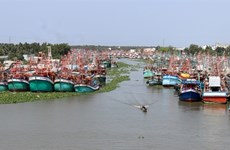State firms told to assess land before equitisation
State-owned businesses must undergo a review of their assets before they can be equitised over the next two years.
 State-owned businesses must undergo an urgent review of their assets before they can be equitised over the next two years. (Photo: thuonggiaonline.vn)
State-owned businesses must undergo an urgent review of their assets before they can be equitised over the next two years. (Photo: thuonggiaonline.vn)Hanoi (VNA) – State-owned businesses must undergo a review of their
assets before they can be equitised over the next two years.
That’s the message from the Ministry of Finance which say companies must submit detailed plans for approval based on regulations.
They must also register their transactions and post on the securities market.
The ministry wants to tighten inspections, supervision and auditing to prevent loss of capital and state assets during equitisation and divestment.
Any sales, purchases or mergers must be transparent, and enterprises need to make sure they have the right mechanisms in place before any deals.
The ministry will also be responsible for policies in regards to labourers, both working and redundant, restructure management and executive positions.
According to the Ministry of Finance’s report, from 2016 to the end of May 2018, 137 State-owned enterprises (SOEs) were equitised. A total of 150.197 trillion VND (6.43 billion USD) was collected from divestments in the reviewed period. In 2017 alone, the figure was 19.385 trillion VND, including 110 trillion VND (4.7 billion USD) from Saigon Beer-Alcohol-Beverage Corporation (Sabeco) which sold 53.59 percent stake in its charter capital.
However, the Ministry of Finance said that the submission and approval of SOE restructuring plans are still slow. By now, the Prime Minister has approved six restructuring plans two lists of divestment.
The Ministry of Transport has approved three restructuring plans, while the Ministry of Information and Communications adopted two plans and the Electricity of Vietnam, nine plans.
The Ministry of Finance said the deals are often too slow and do not conform with the plan approved by Prime Minister Nguyen Xuan Phuc.
Explaining reasons for the delay, the ministry said that some ministries, branches and localities were not strict enough.
In addition, equitised enterprises still have many problems in finance, land and labour in the pre-equitisation period which requires time to process.-VNA
That’s the message from the Ministry of Finance which say companies must submit detailed plans for approval based on regulations.
They must also register their transactions and post on the securities market.
The ministry wants to tighten inspections, supervision and auditing to prevent loss of capital and state assets during equitisation and divestment.
Any sales, purchases or mergers must be transparent, and enterprises need to make sure they have the right mechanisms in place before any deals.
The ministry will also be responsible for policies in regards to labourers, both working and redundant, restructure management and executive positions.
According to the Ministry of Finance’s report, from 2016 to the end of May 2018, 137 State-owned enterprises (SOEs) were equitised. A total of 150.197 trillion VND (6.43 billion USD) was collected from divestments in the reviewed period. In 2017 alone, the figure was 19.385 trillion VND, including 110 trillion VND (4.7 billion USD) from Saigon Beer-Alcohol-Beverage Corporation (Sabeco) which sold 53.59 percent stake in its charter capital.
However, the Ministry of Finance said that the submission and approval of SOE restructuring plans are still slow. By now, the Prime Minister has approved six restructuring plans two lists of divestment.
The Ministry of Transport has approved three restructuring plans, while the Ministry of Information and Communications adopted two plans and the Electricity of Vietnam, nine plans.
The Ministry of Finance said the deals are often too slow and do not conform with the plan approved by Prime Minister Nguyen Xuan Phuc.
Explaining reasons for the delay, the ministry said that some ministries, branches and localities were not strict enough.
In addition, equitised enterprises still have many problems in finance, land and labour in the pre-equitisation period which requires time to process.-VNA











